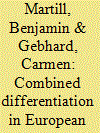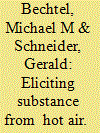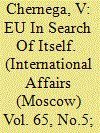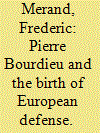| Srl | Item |
| 1 |
ID:
190067


|
|
|
|
|
| Summary/Abstract |
Sustaining meaningful defense cooperation in Europe is made difficult by defense-industrial fragmentation, a multiplicity of institutional frameworks, divergent strategic cultures and domestic opposition to integration. The European Union’s recent foray into defense integration incorporates multiple forms of differentiation to overcome these barriers, with Permanent Structured Cooperation (PESCO) characterized by selective membership, external participation, and project-based clustering. Such “combined differentiation” offers an instructive example of how EU practices and principles can contribute to meaningful defense collaboration, even though Brussels is often thought a weak actor externally. It also illustrates how distinct forms of differentiation can be embodied within a single structure to accommodate complexity in strategic preferences. Using the example of PESCO, this article shows how “combined differentiation” has emerged as a response to the nature of the European defense landscape and how debates between member states about how to respond to specific challenges have brought about further differentiation over time.
|
|
|
|
|
|
|
|
|
|
|
|
|
|
|
|
| 2 |
ID:
095022


|
|
|
|
|
| Publication |
2010.
|
| Summary/Abstract |
The results of deliberations in multilateral fora are often considered ineffective. Decision making in the European Union (EU) and in particular its key intergovernmental body, the European Council, poses no exception. Especially in the domain of EU foreign and security affairs, the unanimity requirement governing this institution allegedly allows nationalist governments to torpedo any attempt to build up a credible European defense force and a unified foreign policy stance. In this article, we take issue with the claim that multilateral summits merely result in "hot air" by looking at whether and how decisions made during EU summit meetings affect the European defense industry. We argue that investors react positively to a successful strengthening of Europe's military component-a vital part of the intensified cooperation within the European Security and Defense Policy (ESDP)-since such decisions increase the demand for military products and raise the expected profits in the European defense industry. Our findings lend empirical support to the view that financial markets indeed evaluate the substance of European Council meetings and react positively to those summit decisions that consolidate EU military capabilities and the ESDP. Each of the substantial council decisions studied increased the value of the European defense sector by about 4 billion euros on average. This shows that multilateral decisions can have considerable economic and financial repercussions.
|
|
|
|
|
|
|
|
|
|
|
|
|
|
|
|
| 3 |
ID:
169527


|
|
|
|
|
| Summary/Abstract |
ELECTIONS to the European Parliament that took place on May 23-26. 2019 reflected the far from simple processes that have been unfolding in the European Union for several years now. They confirmed the desire of a fairly big number of voters to see new people among the political elites. The Right and Left centrists that had dominated the parliament for many years lost their traditional majority and, therefore, the chance to elect the chairman among themselves. This was not the only surprise.
|
|
|
|
|
|
|
|
|
|
|
|
|
|
|
|
| 4 |
ID:
184248


|
|
|
|
|
| Summary/Abstract |
There is an intense debate in international relations scholarship on whether the benefits accrued by arms production globalization outweigh the risks of depending on foreign suppliers. Europe is an interesting case: although regional protection could help Europeans mitigate exposure to global actors, the prospect of regional integration generates concerns about autonomy within Europe itself. We depict European defense cooperation as a “two-level playing field,” whereby market size informs a country’s hedging between global-external and European-internal competitors. First tiers push for defense market integration because they expect to be strengthened vis-à-vis global players but also because market size gives them a competitive advantage over fellow Europeans. Second tiers resist market integration, as they worry it might lead to first-tier dominance. To probe our hypotheses, we examine the behavior of two first tiers (France and Germany) and two second tiers (Poland and Sweden) in the context of the European Defense Fund.
|
|
|
|
|
|
|
|
|
|
|
|
|
|
|
|
| 5 |
ID:
097373


|
|
|
|
|
| Publication |
2010.
|
| Summary/Abstract |
This paper uses an analytical framework derived from Pierre Bourdieu's sociology to explain the genesis of the European Security and Defense Policy (ESDP). Long-term social and institutional processes at work in the making of ESDP are addressed through an emphasis on the institutionalization of social fields, the impact of structural crises, and the socialization of policy makers into specific schemes of perception and action (habitus). Two arguments follow from this framework. First, the paper shows that the creation of ESDP after 1998 would have been impossible without the prior institutionalization of two transgovernmental arenas: (1) the European foreign policy field, wherein EU diplomats vie for influence over EU policies; and (2) the international defense field, centered upon military relations within NATO. Second, ESDP results from the strategies of a number of diplomats and military leaders who, following the end of the Cold War, perceived that they faced important organizational crises in their respective fields. This sociological framework provides a more nuanced account of ESDP's creation than that proposed by the two dominant explanations in international relations theory-realism's balancing and constructivism's strategic culture convergence. Combining structural and ideational factors, it elucidates three empirical puzzles: the lack of opposition to ESDP when it was launched, the motives of policy makers who proposed ESDP, and the disappearance of alternative options for the European security architecture.
|
|
|
|
|
|
|
|
|
|
|
|
|
|
|
|